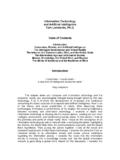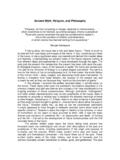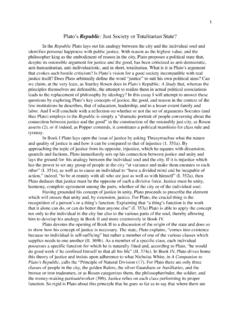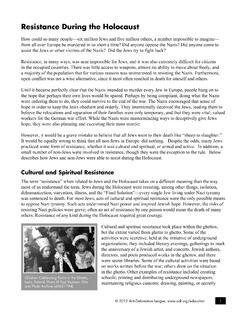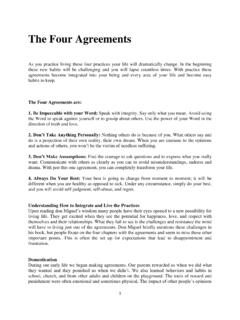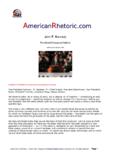Transcription of Theories of Ethics - Center for Future Consciousness
1 Theories of EthicsThomas LombardoWithin human history and continuing into present times, we find many Theories of Ethics and the good. Such Theories arise in religion, spiritual traditions, philosophy, social-political-historical systems, literature and the humanities, social and cultural movements, and pop psychologies. It is important to get a sense of these different Theories as a foundation for thinking about and determining the nature of the good and the good Future ; the Theories will help us to see the territory of ethical Consciousness the main themes, issues, and points of disagreement.
2 In formulating a philosophically sound and historically informed approach to Ethics , it is critical to understand what has been thought and what has been said regarding the nature of the good. I introduce and describe these various Theories in terms of contrasting pairs, but we should keep in mind that many of these Theories are not mutually exclusive and can be combined and synthesized in numerous and varied configurations (Thiroux and Krasemann, 2009). This list of ethical Theories focuses on the question of the source or foundation of Ethics , the means by which we determine what is good, and certain general qualities regarding the nature of the good.
3 I do not fully address the question of what specific qualities (values, virtues, principles, standards) make up the good. See my book Future Consciousness for a more in depth review on this latter issue. In introducing these Theories , I not only describe them but also evaluate them, noting basic weaknesses and strengths, relative to varied criteria for determining their validity and value. Here is the list of contrasting pairs of ethical Theories : Ethical dualism !!! Anti-Dualist Theories Positive Negative Absolutism !!! Rationalism Divine Command/Obedience!
4 Self-Determination Universalism !!! Relativism Theistic!!!! Secular/Naturalistic Egocentric (Egoistic) !! Caring/Social Present Hedonism !! Future Hedonism Consequentialism !! Intrinsic Value (Deontological) Objectivism (Realism) !! Subjectivism Empiricism !!! Nativism Anthropocentric !!! Ecocentric or Cosmo-centric Emotional/Intuitive!! Rationalism Eternalism !!! Evolutionism Abstract !!!! Particular Values !!!! Virtues1To begin at the top of the list, there is the general thesis that Ethics involves a fundamental distinction or polarity between what is good and what is bad.
5 Ethical dualism, which comes in many forms, asserts that there is a right way and an opposing wrong way regarding values and morals. In the West, historically we have the notions of good and evil, which are diametrical opposites to each other. Good and evil have been personified in the West, in the form of God and Satan two spiritual personae of opposite moral qualities. Within ethical dualism, the goal of Ethics of leading the good life is to pursue what is good and avoid (or even fight against) what is evil or bad. From an ethical dualist perspective, the good is seen as a forced choice, if not confrontation between the polarities of right versus wrong between the darkness and the light a metaphor to be found in religious, spiritual , and even philosophical views of Ethics .
6 Ethical dualism depicts Ethics as an either-or situation: One is on the side of good, or on the side of evil with us or against us with no in between. Analogously, the distinction between virtue and vice, as good versus bad character traits, is a form of ethical dualism. Within a dualistic mindset, do we lead a life of virtue, or lead a life of vice? Counter-arguments and perspectives against ethical dualism include: Good and evil are not totally independent or separate realities, but each, in some sense, requires the other you can t have the good without the bad; perhaps everything and everyone in reality is a mixture of the good and the bad, necessarily so; at the very least, the concept of good cannot be understood without the concept of evil.
7 The good versus evil distinction sets up social oppositions that frequently support and justify us versus them thinking, creating feelings of self-righteous superiority and antagonism; good versus evil thinking leads to oppression, war, and even genocide (that is, evil results). Thinking in terms of good versus evil is often self-serving; it is the other who is invariably evil. Good versus evil sets up internal personal conflicts as well, creating fragmented, distressed, guilty, and anxious minds, that is, unhappy results inconsistent with psychological well being.
8 As humanity is fragmented and dichotomized through the good versus evil distinction, so is the individual conscious human mind. There is no real evil or wrong in the world at all (or in humans) everything (everyone) is good but due to our ignorance and limited perspective, we can t see this, especially in others. There is neither good nor evil in the world (or in people). The polarity is a mental invention we impose on reality. Good versus evil is subjective rather than objective. Instead of thinking of Ethics in the simplistic terms of a basic polarity, it is more realistic to think in terms of degrees or levels of what is good.
9 There is no ultimate good and we can always improve upon the Ethics of our thinking and behavior. Ethics is a journey and progression rather than a simple clean-cut oppositional choice. (Lombardo, 2011b, Chapters Four and Nine).2 Yet, in support of ethical dualism, doesn t it (at least sometimes) seem that an act is ethically good, whereas other times an act seems just plain immoral or wrong? Don t we observe clear examples of the polarity of good and evil in the world? Moreover, what is ethically good possesses qualities that are the opposite of those qualities found in what is ethically evil, and this existential contrast would support ethical dualism.
10 Further, ethical dualism provides a psychologically natural framework for understanding the Ethics of life; perhaps we are predisposed to create conceptual contrasts and think and act in such terms? We need the oppositional contrast or polarity to clarify and make sense out of the ethical dimension of life, and to set motivational directions for what to pursue and what to avoid. Psychologically, perhaps we can not have good without evil, or right without to the dualist conception of Ethics , there is also the distinction between positive and negative Ethics . An Ethics can be expressed and practiced putting the emphasis on what a person should do in order to be ethical.

